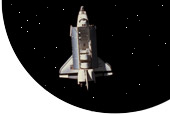Loading |
 |
|
||||||||||||||||||||||||||||||||||||||||||
Shuttle manager reflects on mistakes: HOUSTON - Marking the first anniversary of the loss of the shuttle Columbia shuttle and its seven astronauts, a newly promoted NASA shuttle official has called on all space workers to adjust their thinking in preparation for resuming shuttle missions and going beyond them to meet the new goals recently set by the White House. And in a break with past NASA practices, he explicitly listed the mistakes he personally made that contributed to last year's disaster. "I have been doing a lot of thinking lately," he wrote, citing the approaching anniversary, a new book on the accident, the success of the Mars rover missions, and "most importantly thinking about the new policy and direction from our leaders." Hale said a worker at Cape Canaveral had complained to him that they hadn't heard any NASA managers admit to being at fault for the disaster. "I cannot speak for others but let me set my record straight," he responded. "I am at fault. If you need a scapegoat, start with me." "I had the opportunity and the information and I failed to make use of it," Hale paid tribute to the space shuttle but was realistic about its problems as well. "The shuttle is a marvelous and revolutionary machine," he wrote. Hale explained that "the shuttle is an amazing machine, but like every other machine ever built, she is the result of a series of compromises, built within financial constraints, a product of the state of the art of technology when she was designed." Spaceflight is not "make-believe" or "virtual reality," Hale pointed out, but is "profoundly real." He added, "I don't know any other agency or any other organization where that is so completely and thoroughly true." NASA Official Assesses Blame, Promotes Vision for Space
Wayne Hale, now the Deputy Space Shuttle Program Manager at the Johnson Space Center in Houston, had previously served for more than two decades in Mission Control. He rose to the post of Flight Director, specializing in the hazardous launch and landing operations. On January 27, the anniversary of the 1967 fire that killed three Apollo astronauts, he issued a three-page letter for NASA employees. Entitled “Adjusting Our Thinking”, the letter placed the disaster in a historical and philosophical context and took on the question of leadership failure head-on. “I don't know what an inquest or a court of law would say,” his letter starkly stated, “but I stand condemned in the court of my own conscience to be guilty of not preventing the Columbia disaster.” “I have been doing a lot of thinking lately,” his letter began, citing the approaching anniversary, a new book on the accident, the success of the Mars rover missions, and “most importantly thinking about the new policy and direction from our leaders.” “In my mind's eye our progress is like the Olympic torch relay: each person and each program holds the flame of exploration and progress high for an allotted portion of the route, and then the torch is passed to the next runner in the relay,” he wrote. “The goal of exploring and settling the solar system will not be completed in our lifetime or our children's lifetime. But we - here and now -- are called to run our lap with skill, dedication, vigilance, hard work, and pride.” But, Hale argued, “the steady grind and necessary constant attention to the daily tasks” distracted workers. “We became complacent in more than our technical abilities. We became complacent about the vision.” As a result, he continued, “we dropped the torch through our complacency, our arrogance, self-assurance, sheer stupidity, and through continuing attempts to please everyone. Seven of our friends and colleagues paid the ultimate price for our failure.” Hale related that a worker at Cape Canaveral had complained to him that they hadn't heard any NASA managers admit to being at fault for the disaster. “I cannot speak for others but let me set my record straight,” he responded. “I am at fault. If you need a scapegoat, start with me.” “I had the opportunity and the information and I failed to make use of it,” Hale explained. “We could discuss the particulars: inattention, incompetence, distraction, lack of conviction, lack of understanding, a lack of backbone, laziness. The bottom line is that I failed to understand what I was being told; I failed to stand up and be counted. Therefore look no further; I am guilty of allowing Columbia to crash.” Hale expressed amazement and gratitude that the Columbia disaster did not lead to the termination of the American human spaceflight program. “A year ago it was my firm belief that a second fatal accident in the shuttle program would result in the lights being turned out at NASA, the vision would go into hiatus for a generation, and we - all of us in the agency - would be through.” “Instead,” he wrote, “the nation has told us to get up, fix our shortcomings, fly again - and make sure it doesn't happen again. . . . The nation is giving us another chance. Not just to fly the shuttle again, but to continue to explore the universe in our generation.” Hale paid tribute to the space shuttle but was realistic about its problems as well. “The shuttle is a marvelous and revolutionary machine,” he wrote. “The achievements that the shuttle has produced will be heralded in the history books of future years. Don't believe the critics when they sell her short.” Nevertheless, he continued, “those of us who know her best know her shortcomings. She is terribly complex; she is extraordinarily difficult to prepare for flight, she is too expensive to operate, and frankly, she is not as safe as we need our human transport vehicle to be.” Hale explained that “the shuttle is an amazing machine, but like every other machine ever built, she is the result of a series of compromises, built within financial constraints, a product of the state of the art of technology when she was designed.” Unlike the DC-3, to which the shuttle has often been compared, it was built without the thousands of different aircraft types that had been built and tested in the decades prior to its construction. “Without similar experience of trial and evaluation building multiple space vehicles,” he argued, “the wonder is that we came so close, not that we fell short.” But the shuttle is not the ultimate in human spacecraft, Hale reminded his colleagues. “Those of us in the shuttle program need to take care lest we become the battleship admirals of the new century; failing to understand when times have changed and in which direction progress is marching toward. We must move out of what is comfortable and familiar. It is time to adjust our thinking.” Spaceflight is not ‘make-believe’ or ‘virtual reality’, Hale pointed out, but is “profoundly real”. He added, “I don't know any other agency or any other organization where that is so completely and thoroughly true.” “ Surrounded by imitations of real life on computers, at the movies, on television, our work has real consequences.” Every flight risks the lives of the crew, the loss of an irreplaceable spaceship, as well as non-material assets. “You must understand that every time the countdown clock reaches T=0, we bet the future, and we do it with the whole world watching. Not only are we wagering the program; we lay the agency on the line. Not only is the agency at risk, but national pride and esteem are in question. Not only national pride is at stake, but we place the human exploration of the cosmos for a generation on the table.” And it is that vision which Hale urges workers to protect. “The vision of future space exploration existed long before we came to work here,” he explained. “It is a natural continuation of the American dream. I signed onto the vision as a schoolboy, long before I came to work here. Many of you did the same. The vision has variations in detail and timetable, but the central theme has not varied for decades.” |
home | profile | articles | books | lectures | jim speaks | humor
links | email
Copyright 2010 James Oberg. All Rights Reserved
Site Designed and Maintained by YoeYo.com
